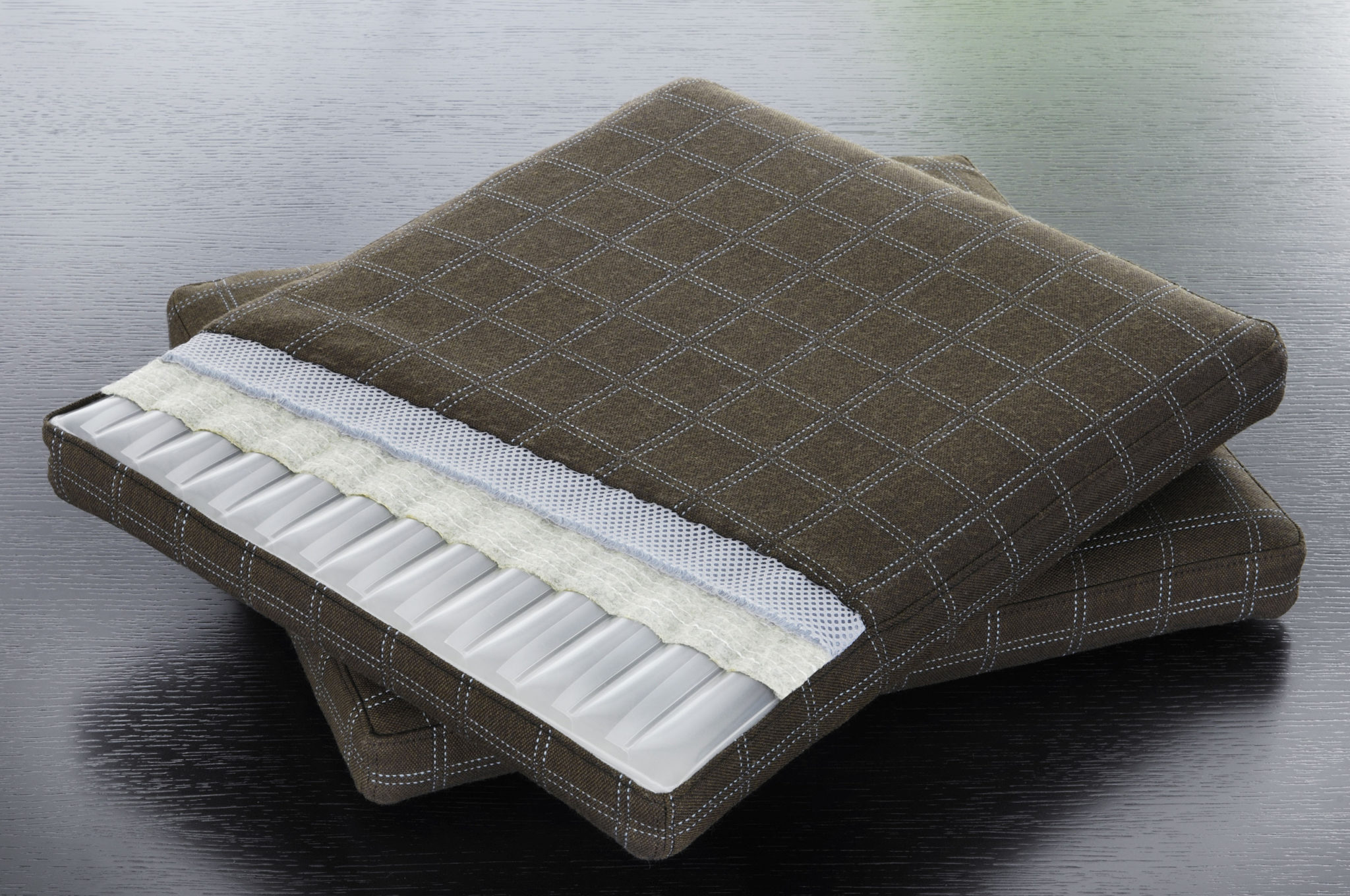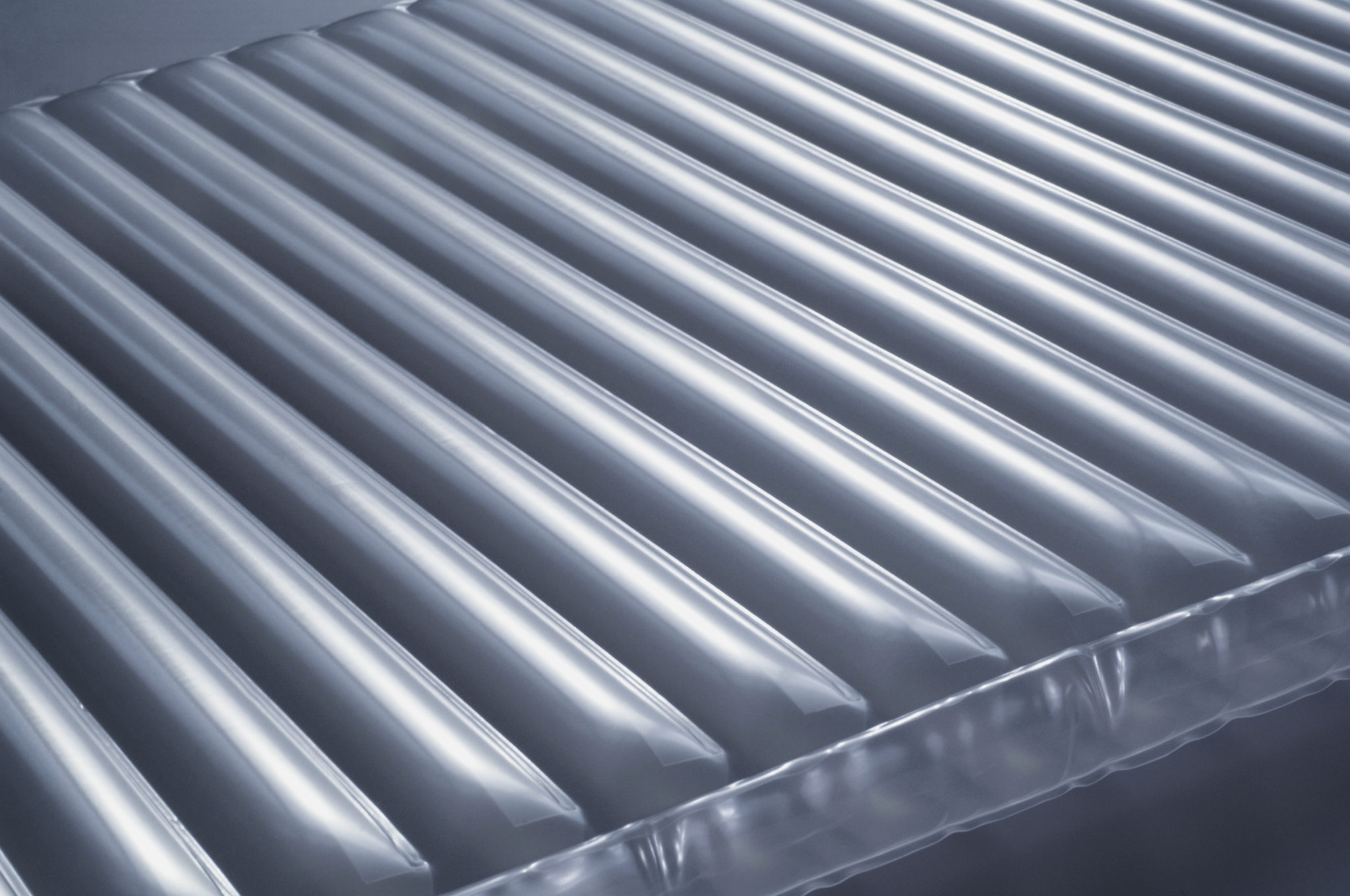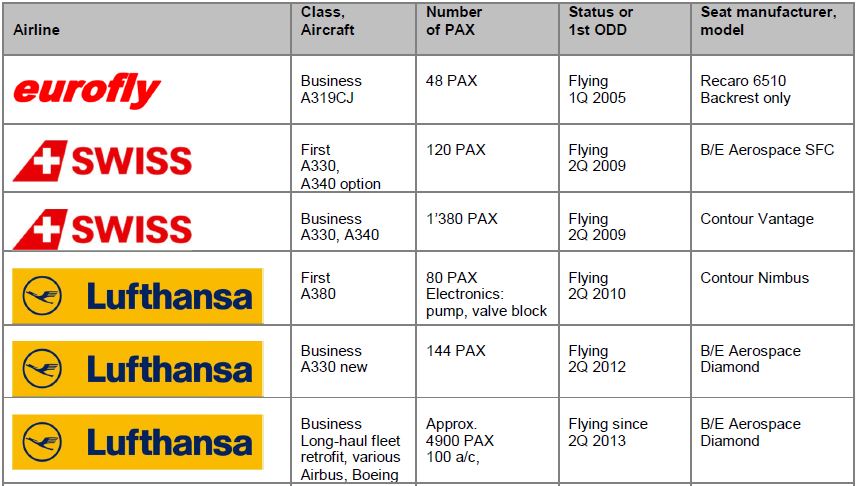Over the last 15 years, Lantal Textiles has worked to break the old paradigm of using foam cushions in premium seats by using lighter air-filled cushions, which it touts as providing “compelling comfort advantages” and hygienic properties. Leading carriers such as Etihad, Lufthansa, Swiss, Air Canada and JetBlue use these cushions in their premium cabins, and Philippine Airlines is the newest customer. Now Langenthal, Switzerland-based Lantal is developing a version of its air-filled Pneumatic Comfort System (PCS) cushion for the longhaul economy market, and plans to unveil a near production-ready model in April 2017 at the Aircraft Interiors Expo (AIX) in Hamburg.
In an interview with RGN, Lantal VP pneumatics Thomas Steiner says the version of its new economy-seat PCS that will be shown at AIX 2017 will be “very, very close to what [the cushion] would look like in production”. And Lantal is “looking at first deliveries in the fourth quarter of 2017 or the first quarter of 2018″. It has marketed the economy-class PCS both to airline customers that already use its premium-class PCS cushions – “it was natural for us to talk to them first” – and to potential new customers, as well as to “all the major players in the Y-class seat space” and aircraft OEMs.
“They’re very excited … because potentially it can solve all the issues on high-class [economy] seats,” adds Steiner. “We believe we can offer the same or better comfort with a substantially slimmer design, which will open up more options for IFE and placement of other electrical and mechanical controls.”
Apart from its smaller size, Lantal’s first economy PCS cushion design will differ from its premium-class PCS units in one major respect: the economy-seat PCS won’t use any electrical power. All of Lantal’s premium-class pneumatic cushions require an electricity supply to the seat to power an in-seat compressed-air pump. This pump, along with the seat’s electronic control interface, provides automatic cushion-pressure adjustment as cabin pressure varies and allows passengers to adjust cushion firmness and activate other PCS functions such as back-massaging.
However, the economy PCS will self-regulate its pressure automatically to maintain the required level of pressure-point-free comfort as cabin altitude varies, by means of a proprietary technology Lantal declines to discuss.

At the heart of Lantal’s PCS pneumatic seat cushions is compressed air enclosed by heavy-duty polyurethane. This air chamber is protected by a combined fire-retardant layer of Nomex and Kevlar, above which a 3-D polyamide layer allows cabin air to circulate, letting the seat cushion ‘breathe’. An outer layer of seat fabric, at the customer’s option given an anti-microbial treatment by Lantal, covers the PCS unit. Image: Lantal
Steiner says Lantal could have designed an economy-class PCS cushion with an in-seat electrical power supply, and eventually it might for new-generation seats, particularly premium-economy seating. “But we feel there is a lot bigger market for a non-electric solution.” This is because the retrofit market represents “part of the market we’re targeting” and “there are a lot of seats out there without” electrical power.
Some longhaul economy seat cushions weighing around 850g are already available, “but their foam loses its rebound a lot quicker than a good foam weighing a little more than 1kg”, suggests Steiner. For Lantal’s economy-seat PCS, “our target is a 50 percent weight reduction” on better-quality foam cushions. “We will get that without losing any comfort.”
“Our longevity target is more than three years,” unlike cushions in today’s economy seats, which must be discarded after about three years because fungus grows in them and the foam degrades. Steiner says fungi cannot grow in the heavy-duty polyurethane-covered pneumatic chambers in Lantal’s PCS cushions or in the Nomex-and-Kevlar protective, fire-retardant and 3-D air-circulating polyamide layers covering the chambers.
This means PCS cushion covers and interiors can be cleaned just by wiping them down, says Luzius Rickenbacher, director, markets, for Lantal Textiles Inc, Lantal’s US subsidiary. Rickenbacher says airline customers also now often request the fabrics on their PCS cushions be covered with anti-microbial treatments Lantal has developed.
(Lantal also has developed a seat fabric which is completely biodegradable upon retirement after 6-7 years. This fabric is made in a completely sustainable manner and without using chemicals. It is discussing the fabric’s use in aircraft seats with Finnair, among others.)

This is what the polyurethane-covered air chamber inside each Lantal Pneumatic Comfort System seat-cushion looks like. Image: Lantal
During the Aircraft Interiors Expo earlier this year in Hamburg, Lantal showed a prototype economy-class PCS cushion “to select experts in the industry, among them 12-13 airlines, seat manufacturers, Airbus and Boeing”. It asked them if “we were on the right track with the product and what they thought of its features”. Lantal fed their generally positive feedback to its R&D department “and tweaked the product” according to their recommendations.
Lantal, meanwhile, is also now preparing to introduce both an adaptive-contouring feature and a gap-filling feature for its premium-class PCS line. The adaptive-contouring feature would automatically contour seats more closely round passengers to hold them more securely during taxi, takeoff and landing (TTL) and when an aircraft encountered turbulence, but would automatically deflate the seat-contouring during normal flight and when passengers reclined their seats into flat beds. Additionally, passengers would be able to adjust the contouring of their seats.
The gap-filling feature will close the gaps that appear between the backrests and cushions of premium-class seats when passengers recline their seats from upright positions into flat mattresses. These gaps create bumps which passengers can feel in their mattresses. But these bumps will disappear in seats fitted with PCS units which would fill the backrest-cushion gaps with automatically inflating and deflating chambers.

Lantal Textiles is developing a longhaul economy-class version of the pneumatic seat cushions it provides for various manufacturers’ longhaul first-class and business-class seats. Image: Lantal
Lantal already has in service an automatic backrest extension in its PCS cushions for B/E Aerospace Super Diamond business-class seats. With the backrest extension the seat is “a lot more comfortable” for tall passengers, says Steiner. Lantal is now offering a feature which extends and retracts seat-pan and backrest length throughout its premium-class PCS line, so passengers can adjust the lengths of their seat-pans and backrests to suit their individual heights.
Already boasting 14 airline customers for its premium-class PCS units, Lantal expects to announce within two months an Asian customer that will use PCS units from 2017 in the first-class and business-class seats of its Airbus A350s. Steiner says Lantal may reveal the carrier’s name in its keynote speech at this month’s AIX Asia exhibition in Singapore. An as yet unannounced Middle Eastern carrier also will install Lantal PCS cushions in its A350 first-class and business-class seats from the fourth quarter of 2018.
Lantal also will announce within two months the name of an unannounced European customer which will use PCS units in its A350 business-class seats. RGN believes this carrier to be Lufthansa, which will receive its first A350-900 in November and is an existing customer for premium-class PCS units. However, Lantal has not confirmed Lufthansa as the customer.
Related Articles:













